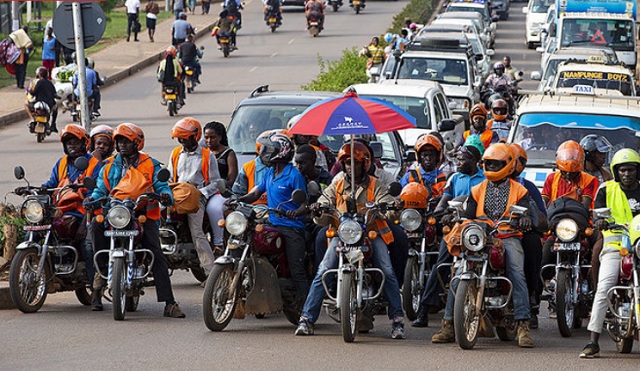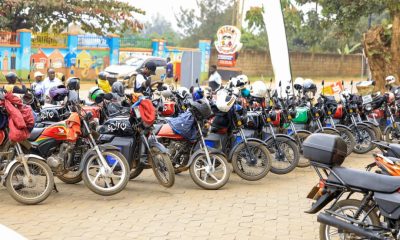Climate Change
Report: Boda boda Bikes Leading Deadly Air Polluters of Cities
Data collected by Makerere University Kampala scientists from a network of over 45 AirQo monitors in Kampala since 2018 indicates that overall, the city areas particulate matter levels are about five times over World Health Organisation guidelines. The levels of particulate matter peaks in the morning (between 6 and 9am), then flattens in the afternoon and peaks again after 5pm. This is consistent with major cities in other parts of the world.
As of 2022, there were an estimated 27 million registered motorcycles in Africa—a 440 per cent increase over the last decade. Crucially, traffic-related air pollution (TRAP) accounts for 25 per cent of global urban air pollution and is linked to higher rates of non-communicable diseases like cardiovascular disease, lung cancer and asthma.
Fine particulate matter smaller than 2.5 millionths of a meter, known as PM2.5, was the fifth-leading cause of death in the world in 2015, factoring in approximately 4.1 million global deaths annually.
Research by Makerere University Kampala scientists has found that, generally, the main drivers of air pollution in Kampala are transport, industry, burning of wood or charcoal and burning of waste. A great deal of pollution therefore comes from vehicle emissions and heavy traffic congestion, according to Maclina Birungi, Communications lead at AirQo.
Two-wheeled petrol-powered motorcycle taxis (commonly known as ‘boda bodas’ ) are a key part of the transport system in Uganda. It is estimated that the country has over 1.5 million boda bodas on the road, amounting to roughly 70% of all vehicles. Boda bodas are crucial in providing last mile transport for people and goods on short trips because they can nip through heavy traffic fast. But their exhaust fumes also pollute the air.
Gabriel Okello, a Senior Research Associate, University of Cambridge, England, explains his researches air quality and air pollution in Africa, and his examination of how life would improve if Uganda’s boda bodas all went electric.
Okello’s Air Quality and NCDs research fellowship is funded by a philanthropic donation from AstraZeneca. This nested project was funded through Cambridge Africa and carried out by Dr. Okello and Dr. Lambed Tatah of the MRC Epidemiology Unit, University of Cambridge.
What public health problems do boda bodas cause?
Most boda bodas run on petrol and release harmful air pollutants that contribute to diseases like lung cancer, asthma and heart disease. These diseases lead to premature deaths. They also put additional pressure on an already overstretched health system.
The greenhouse gases from boda bodas’ exhaust pipes also worsen climate change. Global warming affects African countries like Uganda and other low-income countries more than it affects wealthier nations. Poverty, weak health systems and high levels of chronic sickness leave people less able to cope with climate change.
Air pollution is the second leading cause of death worldwide, causing over 1 million premature deaths each year in Africa. Over 30,000 of these deaths every year happen in Uganda. Tackling air pollution is crucial not only for protecting public health and the environment but also for fighting climate change.
How would switching to electric boda bodas help?
I co-authored a study that used air quality software to model the impact of particulate matter 2.5 on air pollution related deaths in Uganda. Particulate matter is a mixture of solid, tiny, dirty particles in the air that we breathe in, causing heart and respiratory illnesses.
Our analysis showed that switching to electric boda bodas in Kampala would improve air quality, reducing particulate matter in the air by 15%. This change would reduce the related deaths by 18%. Death from diseases linked to the heart and blood vessels would drop by 17%.
Fewer young children would die from severe lung infections. The deaths of under-fives from air pollution related sickness would fall by 12% and chronic lung disease deaths in adults aged over 25 would drop by 11%.
Simply put, cleaner transport means cleaner air, better health for everyone and fewer people dying.
Results from our study also show that switching to electric boda bodas saved drivers money on petrol. Even when they made fewer trips, electric boda boda drivers turned a greater net profit of 11% more than their petrol-using counterparts due to lower energy and maintenance cost.
Nearly all Uganda’s electricity (90%) is already renewable energy. Doing away with motorbikes that use petrol would have the benefit of reducing the country’s reliance on petrol (fossil fuel) use, which costs Uganda US$2 billion annually. This would boost energy independence and strengthen the economy.
A transition to electric boda-bodas is sustainable. It would also create more green jobs in engineering, battery swapping, and charging infrastructure.
What’s preventing the switch to electric motorbikes?
The Ugandan government’s support for electrified public transport shows strong readiness for change. The government and private sector have already introduced 24 electric buses for mass transit, supported by 16 fast chargers and 100 battery swapping stations. There are already over 1,500 electric motorcycles in the country.
Uganda is also seeing a rise in e-mobility startups. These are small businesses that sell electric boda bodas and refurbish petrol motorbikes to run off electricity. They also offer battery-swapping, so that electric boda-bodas don’t have to waste time charging their batteries and can easily swap their batteries for fully charged ones throughout the working day.
However, our survey of 280 boda boda drivers uncovered that there are obstacles preventing drivers from switching to electric motorbikes. For example, there aren’t enough battery charging stations in the country. This can disrupt reliable charging, make drivers anxious and sometimes lead to times where boda bodas can’t run, which reduces earnings.
Not all boda boda drivers are aware that electric motorbikes could benefit them. Many are uncertain about the technology’s reliability and financial viability.
Another problem is the few trained and skilled mechanics for electric boda bodas. This means longer repair times and decreased efficiency. Poor road conditions in cities also deter drivers, as they worry that damage to electrical components on the bike could be very expensive to fix.
Lastly, the high initial cost of electric boda bodas is a huge barrier. Petrol boda bodas generally cost around US$1,200, whereas electric boda bodas generally cost around US$1,911. However, cheaper electric boda bodas are now being sold for US$1,365.
What needs to happen next?
Electric transport, or e-mobility, will only succeed if policymakers, businesses, users, researchers and investors work together to overcome these problems, create plans to grow electric transport in Uganda and raise awareness about the benefits of electric boda bodas.
The government should also establish vocational training programmes to build a skilled workforce for e-mobility maintenance and operations.
E-boda companies also need to expand battery-swapping networks to increase the reliability of electric motorbikes and ease driver concerns.
The e-boda companies should also partner with financial institutions to offer microloans to make it easier for drivers to switch. Older petrol boda bodas can be retrofitted to electric, and the government should offer incentives to drivers to do this or to buy new electric motorbikes. The government should lead by example by transitioning its motorcycle fleet to electric.
Government should also improve power supply and invest in decentralised charging for wider adoption.
Switching to electric boda bodas would alleviate air pollution and related public health and climate risks in both Kampala and across Uganda. This switch could help decrease harmful emissions, improve health outcomes, and create thousands of green jobs, all while promoting energy independence.
As climate change becomes worse, local solutions like this are more important than ever. For Kampala’s transport-related air pollution, locally relevant and feasible solutions exist and steps can be taken to cut air pollution now.
Adopted from The Independent
Comments



























